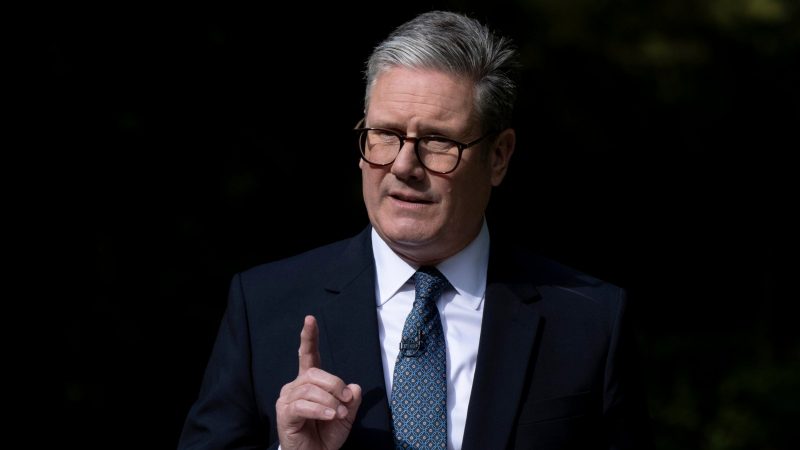
Politics moves very quickly. Just as the first 100 days came and went, within a blink of an eye we’ll find ourselves heading towards another election and asking whether the change Labour promised has actually materialised.
That’s why Keir Starmer’s ‘Plan for Change’ speech later this week carries more weight than the usual political set-piece. In it, he is expected to outline the ‘delivery targets’ for key manifesto pledges, giving voters concrete benchmarks to judge his government by in four years’ time. This signals that the Prime Minister understands warm words about transformation won’t suffice when election season rolls around once again.
Targets matter, of course. But targets are not a plan. If we look to Biden’s America, one of the clearest lessons from the recent US election is that politicians must do more than set benchmarks – they must also learn how to effectively communicate progress.
‘Starmer’s speech needs to deliver real solutions’
Thursday’s speech should begin to address this communication gap as well as inject some much-needed urgency after a listless start to Labour’s term, but it still sidesteps a more uncomfortable truth: That in many crucial policy areas, the opposition years weren’t spent doing the necessary heavy lifting required for effective governance. No amount of messaging finesse can paper over gaps in basic policy architecture.
At The New Britain Project, we’ve begun examining the practical challenges of delivering Labour’s pledges. Our latest analysis focused on the flagship breakfast club initiative – a policy that exemplifies both the promise and peril of Labour’s approach to governing. The ambition behind the initiative is admirable, but its delivery risks repeating past mistakes of the Conservatives’ National Tutoring Programme, where good intentions were derailed by bureaucratic box-ticking.
This example illustrates the broader challenge for Labour: diagnosing problems with clarity is only the first step. Delivering real solutions requires just as much precision.
READ MORE: ‘Voters will reward Labour in 2029 if Starmer fixes public services’
‘The window for moving from planning to delivery is closing fast’
Labour’s path back to government was hard-won and methodical, nothing short of remarkable. The journey from electoral defeat required discipline, unity and strategic clarity – the revival showed what focused, determined leadership could achieve.
Yet that same intensity that marked Labour’s path to power now needs to find its equal in how they approach the actual business of government.
We’re seeing this across multiple areas – take housing, where the Office for Budget Responsibility projects Labour will deliver fewer homes than their Conservative predecessors. Or employment rights, where the Regulatory Policy Committee recently declared the bill ‘not fit for purpose’ These examples highlight the gap between ambition and execution – a gap Labour must urgently close.
Transitioning to government after 14 years in opposition is no small feat, and the natural challenges of such a shift are understandable. But the window for moving from planning to delivery is closing fast.
Whitehall bears some responsibility for the slow start. Fourteen years of Conservative rule have ingrained an institutional default to incrementalism. However, Labour’s mindset in its preparation for government did it no favours either – where there was an underlying assumption that politicians need only set the destination, while the civil service figures out the rest. Anyone who has watched the machinery of government splutter through recent years should have known better.
SIGN UP: Get the best daily roundup and analysis of Labour news and comment in our newsletter
‘Labour must be able to show it has delivered the change the country deserves’
Labour won an election on the back of not just disillusionment with the Conservatives, but disillusionment with politics altogether. The public’s patience is thin. They voted for transformation, not just a change in management. If Labour can’t shift from campaign mode to governing mode – with urgency, clarity, and detailed plans for delivery – they risk facing the same verdict at the next election that they just delivered to their predecessors: thanks, but no thanks.
Thursday’s speech, with its promise of measurable milestones and a ‘ruthless focus on working people’s priorities,’ shows Starmer understands the stakes. But setting targets is the easy part. The harder task is building the machinery of delivery that can actually hit them.
In five years’ time, Labour must be able to show that it has delivered the change the country deserves. If it doesn’t get the details right now, it will only have itself to blame.
For more from LabourList, follow us on Threads, Bluesky, X, Facebook, Instagram or WhatsApp.
- SHARE: If you have anything to share that we should be looking into or publishing about this story – or any other topic involving Labour– contact us (strictly anonymously if you wish) at [email protected].
- SUBSCRIBE: Sign up to LabourList’s morning email here for the best briefing on everything Labour, every weekday morning.
- DONATE: If you value our work, please donate to become one of our supporters here and help sustain and expand our coverage.
- PARTNER: If you or your organisation might be interested in partnering with us on sponsored events or content, email [email protected].




More from LabourList
Ashley Dalton resigns as health minister for cancer treatment
Paul Nowak column: ‘Labour must focus on the basics’
‘Labour’s two-child cap victory rings hollow while asylum-seeking children remain in poverty’